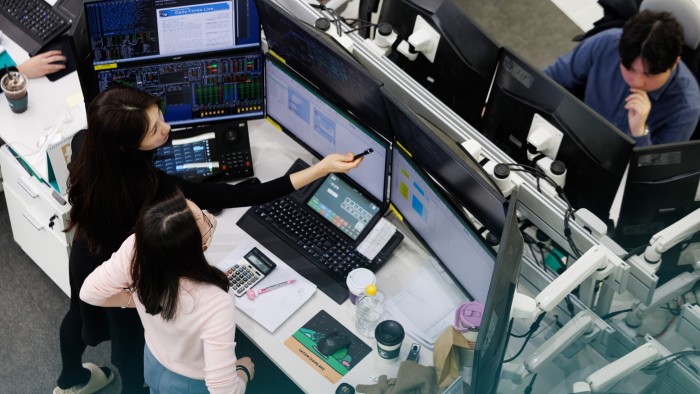Unlock the Editor’s Digest for free
Roula Khalaf, Editor of the FT, selects her favourite stories in this weekly newsletter.
A speculative frenzy in dollar-backed stablecoins has prompted South Korea to lift a 14-year ban on domestic financial institutions buying so-called kimchi bonds as it seeks to draw in offsetting capital inflows.
The Bank of Korea had prohibited local investment in kimchi bonds — foreign currency debts issued onshore and intended for conversion into South Korean won — in 2011 because of concerns they would expose local issuers to currency mismatches.
But the policy change shows the central bank’s alarm about weakness in the won and a lack of foreign currency liquidity as South Korean retail investors rush to invest in overseas stocks and dollar-backed stablecoins, with trading in the crypto instruments hitting Won57tn ($42bn) in the first quarter of the year.
“This measure is expected to contribute to resolving the imbalance in forex supply and demand by improving foreign currency liquidity conditions and easing pressure on the weak won,” the BoK said in a statement.
The won strengthened as much as 1.2 per cent on Monday to Won1,347 a dollar, the highest level in eight months, before paring some of its gains to trade at Won1,353.
It is the government’s latest move to deregulate the country’s foreign exchange market and boost foreign currency inflows after its forex reserves fell in May to their lowest level in five years.
The government has raised hedging limits in currency derivatives, eased restrictions on foreign currency lending by domestic banks and increased the forex swap line between the BoK and the National Pension Service to reduce the state-run pension fund’s dollar buying in the domestic market.
It expects kimchi bonds to attract more dollars to the country and counterbalance the retail outflows.
“We expect more Korean branches of foreign financial institutions to bring dollars for kimchi bond investment. This will increase dollar supply in the domestic market,” said a BoK official.
The main issuers of kimchi bonds in the past were foreign subsidiaries of South Korean companies that needed dollar funding. Analysts expect more domestic groups to issue kimchi bonds as they can now sell foreign currency debt and convert it to won for domestic use.
“There is increasing perception that the Korean won is too weak relative to its fundamentals and the government wants the local currency to appreciate further,” said Hwang Sei-woon, senior research fellow at Korea Capital Market Institute.
“The latest measure signals higher demand for the won in the long term, reflecting the government’s will to open up the forex market further.”
The won has strengthened more than 8 per cent against the dollar this year on increased political stability following last year’s martial law turmoil.
A new government that took office this month has pledged higher fiscal spending, and Seoul is under pressure from Washington to boost the value of its currency in trade talks.
Despite efforts to improve market access for foreign investors, South Korea has not been upgraded to developed-market status by global index provider MSCI, which has cited impediments to forex market liberalisation.
Hwang cautioned that domestic companies would not rush to issue kimchi bonds, given higher funding costs in the dollar compared with those in the won.
https://www.ft.com/content/0f93c015-6e1f-4ef3-accc-8d060983284a


